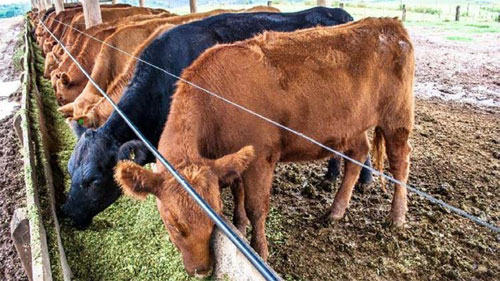Brice Wallace
Utah’s fifth inland port, recently approved, is expected to have impacts throughout the state and upcoming generations.
The Central Utah Agri-Park, earlier known as the Six County Agri-Park, is seen as vital for the state’s agriculture sector. Encompassing roughly 35,000 acres in three parts of Juab County, the project area is expected to become a hub for agricultural processing and technology.
The project area was approved during a recent meeting of the Utah Inland Port Authority board in Nephi.
With access to rail and highways, the Agri-Park is envisioned to serve as a site for protein and other agricultural processing, agriculture technology, agriculture implements and tools, cold storage and value-added beef processing.
“We’ve been looking forward to this meeting for a long time,” Ben Hart, UIPA’s executive director, told the board. “We feel like this is one of those counties that is just naturally set up for an inland port project area.”
The Agri-Park includes the 1,600-acre Currant Creek Industrial Park, with opportunities for manufacturing, distribution and access to the North American rail network; the 27-acre Nortonville Rail Industrial Site, built in 2019-20 and Juab County’s newest rail-served facility; and the 33,700-acre Juab Agri-Park, with rail and highway infrastructure to facilitate the production, processing and transportation of goods both within Utah and to external markets.
The project area includes several existing rail-served facilities, including Canyon Fuel Co. Coal Loadout, Central Utah Grain, Redmond Minerals, Azomite Minerals and John Kuhni Sons Inc.
Clinton Painter, Juab County commissioner, told the board that food security became an issue during the COVID pandemic, when fruits, vegetables and proteins were in limited supply or even nonexistent at stores. The Agri-Park will focus on companies involved in agriculture and agriculture-adjacent business fields, he said, with those companies having access to “a shovel-ready location.”
“In short, we want to save the family farm, which is so important in rural Utah,” Painter said. “This is what our state was built upon, and we want to be able to provide avenues where they can continue their productions right here in Utah, [where] they don’t have to send their cattle out of state for processing and then come back again to be sold, adding additional expense.”
“The issue keeps coming back to the processing,” added Jenna Draper, economic development director for the Six County Association of Governments. “They cannot get any of their products anywhere fast enough for them to be processed and sent to market in enough time before they spoil.”
“Our partnership with the inland port is going to allow them to open up the global market, which is something that they have never even dreamed that could be a possibility for the family farms here,” she said.
“It’s a real opportunity for the future of not only the six counties” but the entire state, said Wade Eliason, acting president of the Utah Farm Bureau. He estimated that the six-county area accounted for about 30 percent of Utah’s agriculture industry. He added that the Agri-Park will provide “hope for the future” for multigenerational farms.
Hart agreed. “We are pushing forward a project and I feel like the board is supporting a project that is really going to help regionally a lot of not only constituents but will have an economic multiplier not just across the communities but across generations. That’s powerful.”
The Agri-Park joins other inland port areas in the state: Salt Lake City’s, which includes parts of Magna, Salt Lake City, West Valley City and Salt Lake County; the 899-acre Iron Springs Inland Port near Cedar City that is being developed, owned and operated by BZI Steel; the 2,200-acre Verk Industrial Park project area in Spanish Fork; and the Golden Spike project area totaling 1,500 acres in Garland, Tremonton, Brigham City and other parts of Box Elder County.
Up for consideration at the board’s Oct. 4 meeting in Milford is a proposed project area in Beaver County. Other sites to be brought before the board later are those in Tooele County and west Weber County.








